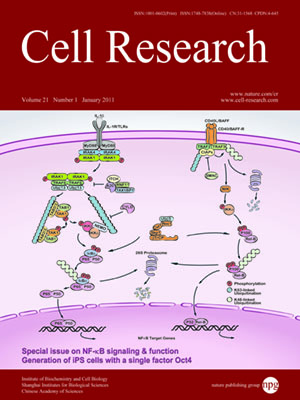
Volume 21, No 1, Jan 2011
ISSN: 1001-0602
EISSN: 1748-7838 2018
impact factor 17.848*
(Clarivate Analytics, 2019)
Volume 21 Issue 1, January 2011: 40-54
REVIEWS
Regulation of NF-κB signaling by caspases and MALT1 paracaspase
Jens Staal*, Tine Bekaert* and Rudi Beyaert
Department for Molecular Biomedical Research ?VIB, Department of Biomedical Molecular Biology - Ghent University, Technologiepark 927, Ghent B-9052, Belgium
Correspondence: Rudi Beyaert,(rudi.beyaert@dmbr.ugent.be)
Caspases are intracellular proteases that are best known for their function in apoptosis signaling. It has become evident that many caspases also function in other signaling pathways that propagate cell proliferation and inflammation, but studies on the inflammatory function of caspases have mainly been limited to caspase-1-mediated cytokine processing. Emerging evidence, however, indicates an important contribution of caspases as mediators or regulators of nuclear factor-κB (NF-κB) signaling, which plays a key role in inflammation and immunity. Much still needs to be learned about the mechanisms that govern the activation and regulation of NF-κB by caspases, and this review provides an update of this area. Whereas apoptosis signaling is dependent on the catalytic activity of caspases, they mainly act as scaffolding platforms for other signaling proteins in the case of NF-κB signaling. Caspase proteolytic activity, however, counteracts the pro-survival function of NF-κB by cleaving specific signaling molecules. A striking exception is the paracaspase mucosa-associated lymphoid tissue 1 (MALT1), whose adaptor and proteolytic activity are both needed to initiate a full blown NF-κB response in antigen-stimulated lymphocytes. Understanding the role of caspases and MALT1 in the regulation of NF-κB signaling is of high interest for therapeutic immunomodulation.
Cell Research (2011) 21:40-54. doi:10.1038/cr.2010.168; published online 30 November 2010
FULL TEXT | PDF
Browse 2060


